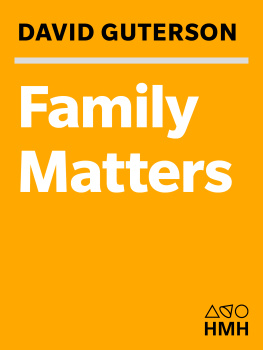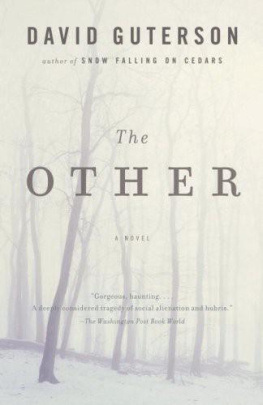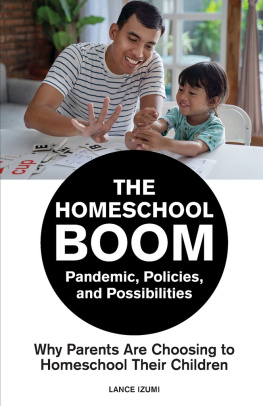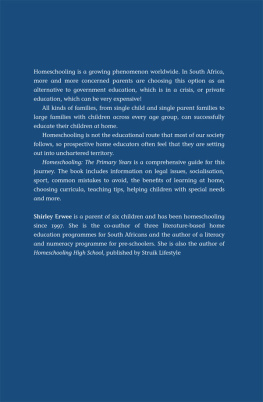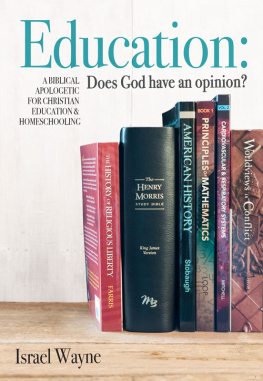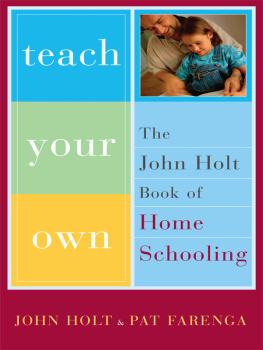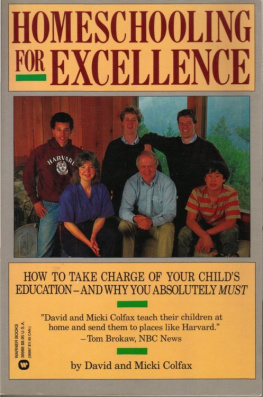David Guterson - Family Matters: Why Homeschooling Makes Sense
Here you can read online David Guterson - Family Matters: Why Homeschooling Makes Sense full text of the book (entire story) in english for free. Download pdf and epub, get meaning, cover and reviews about this ebook. year: 1993, publisher: HarperCollins, genre: Home and family. Description of the work, (preface) as well as reviews are available. Best literature library LitArk.com created for fans of good reading and offers a wide selection of genres:
Romance novel
Science fiction
Adventure
Detective
Science
History
Home and family
Prose
Art
Politics
Computer
Non-fiction
Religion
Business
Children
Humor
Choose a favorite category and find really read worthwhile books. Enjoy immersion in the world of imagination, feel the emotions of the characters or learn something new for yourself, make an fascinating discovery.
- Book:Family Matters: Why Homeschooling Makes Sense
- Author:
- Publisher:HarperCollins
- Genre:
- Year:1993
- Rating:4 / 5
- Favourites:Add to favourites
- Your mark:
- 80
- 1
- 2
- 3
- 4
- 5
Family Matters: Why Homeschooling Makes Sense: summary, description and annotation
We offer to read an annotation, description, summary or preface (depends on what the author of the book "Family Matters: Why Homeschooling Makes Sense" wrote himself). If you haven't found the necessary information about the book — write in the comments, we will try to find it.
Family Matters: Why Homeschooling Makes Sense — read online for free the complete book (whole text) full work
Below is the text of the book, divided by pages. System saving the place of the last page read, allows you to conveniently read the book "Family Matters: Why Homeschooling Makes Sense" online for free, without having to search again every time where you left off. Put a bookmark, and you can go to the page where you finished reading at any time.
Font size:
Interval:
Bookmark:
Copyright 1992 by David Guterson
All rights reserved. No part of this publication may bereproduced or transmitted in any form or by any means,electronic or mechanical, including photocopy, recording,or any information storage and retrieval system, withoutpermission in writing from the publisher.
For information about permission to reproduce selections from this book, write to or to Permissions, Houghton Mifflin Harcourt Publishing Company, 3 Park Avenue, 19th Floor, New York, New York 10016.
hmhco.com
Portions of this book previously appeared in different
form in Harpers Magazine.
The Library of Congress has cataloged the print edition as follows:
Guterson, David.
Family matters: why homeschoohng makes sense/David Guterson.
1st Harvest ed.
p. cm.(Harvest book)
Includes bibliographical references and index.
ISBN 0-15-630000-1
1. HomeschoolingUnited States. I. Title.
LC40.G89 1993
649'.68dc20 93-5042
ISBN 978-0-15-630000-1 paperback
e ISBN 978-0-547-53938-6
v2.0518
My thanks to Brian Ray, Jon Wartes, and Sandi Hall for generously sharing sources and research. I am also greatly indebted to Patrick Farenga for taking an interest in this book from the beginning and for his invaluable suggestions and insights.
Many public educators were kind to me and provided assistance and information, among them Betsy Abrams and Carol Nimick of the Twin Ridges School District, Eleanor Hill of the Lake Washington District, and Marci Van Cleave and Marcia Harris in Chimacum, Washington.
Colin Harrison provided early encouragement and deft editorial advice; he gracefully urged me to think clearly in print about educational matters. Anne Borchardt prompted me to focus on education at a time when my attention was wandering, and Leigh Habers enthusiasm for the book did much to keep me at it. Alane Salierno Mason stayed with me the whole wayher devotion to the manuscript is discernible on every one of its pages.
I am grateful to many friends, colleagues, and neighbors for reading various parts of the book and for taking the time to comment on it: Julia Wan, Marilyn Place, Phil McCrudden, Matt Johnson, Barbara Chrisman, Ralph and Deborah Cheadle. My father, Murray Guterson, also read and discussed parts of the book with me and assisted in my research into legal matters. Alan and Lois Park, Larry and Jill Miller, and Bob and Ann Radwick have all been extremely generous to me in a variety of ways. Their kindness is much appreciated.
My childrenTaylor, Travis, and Henryasked the kinds of questions about what I was doing that encouraged me to do it better. I am grateful to them for their curiosity and goodwill arid for their conversation.
Finally, I am deeply grateful to Robin Radwick Guterson for her close reading, incisive commentary, and love.
To the oft-cited triumvirate of what is ineluctable in lifebirth, death, and taxeswe Americans are prone to add an unspoken fourth: school.
In fact, we Americans share an allegiance to school that remains for the most part unarticulated. Many of us see schools as the foundation of our meritocracy and the prime prerequisite to a satisfying existence. School is the institution sine qua non, the elemental experience of childhood. Most of us cannot imagine an American youth today without hallways, classrooms, and cafeteria trays; the kind of locker flirtations immortalized in cinema; homework, varsity basketball games, chalkboards, and multiple-choice examinations. School is so deeply ingrained in us that a call for learning outside of it, without it, can sound as strange as a call for us to try to live without food. School is inevitable; school is a fact of life.
In my classroom at a high school in an upper-middle-class milieu where education is taken, in relative terms, seriously, we read with great purpose precisely those stories that tacitly reaffirm this loyalty to schools: In Lord of the Flies a pack of schoolboys degenerate into killers because no teachers are around to preserve the constraints of civilization; in To Kill a Mockingbird the venerable Atticus insists that, for all its shortcomingsand despite the fact that Scout is best educated by his own good example and by life in the larger web of Maycomb County (and that Atticus himself never went to school)Maycomb Elementary is mandatory. Catcher in the Rye is in large part the story of its protagonists maladjustment to schools, and though J. D. Salinger is highly critical of the hypocrisy behind a good education he ultimately offers up Mr. Antolinian English teacheras Holden Caulfields last best hope. Finally, A Separate Peace might explicitly condemn the neurotic competitiveness of school life, but its implicit messagethe one that gets taught in schools, anywayis that Gene Forrester should have paid closer attention to his English teachers while they discoursed on the nature of evil.
The doctrine of schools necessity, which we early imbibe in the very belly of the beast, is inevitably supplemented once were disgorged. The daily implacability with which the media report the decline of schools, the constant knell of ominous statistics on the sorry state of American education, the curious popularity of such books as E. D. Hirsch, Jr.s Cultural Literacy and Allan Blooms The Closing of the American Mind these are portents, foremost, but they also serve to reinforce our shared assumption that school is required not merely because we attended it but also because our common life is so precarious. Our national discussion about education is a desperate one, taking place, as it does, in an atmosphere of crisis, but it does not include in any serious way a challenge to the notion that every child should attend school. Why? Because, quite simply, there is no context for such a challenge; because we live in a country where a challenge to the universal necessity of schools is considered not merely eccentric, not merely radical, but fundamentally un-American.
Furthermore, we Americans are likely to view schools as the supreme agents of democracy andas E. D. Hirsch would have itof cultural literacy. Jeffersons vision, after all, was that school would function as democracys proving ground, a place where all comers would take their best shot at the American dream and where that dream would ultimately find its most basic and enduring sustenance. Not to show up at allat all!is thus to give in to the forces of cultural decline, to withdraw at the moment of national crisis, and to suggest openly that if Rome is really burning, the best response is not to douse the flames or even to fiddle away beside the baths but to go home and lock the door.
Our schools are celebrated daily in public-service advertisements (on MTV, for example, which exhorts students to stay in school in order to make something of themselves, and at time-outs during NBA basketball games) as conduits of upward mobility for the poor and disenfranchised; they are, at least in our history books, the best opportunity for the children of immigrants to gain a purchase on the American dream. Schools have gradually become associated in our minds with what is finest about our political and economic traditions. Our democratic sentiments, it turns outso deeply felt, so altogether v to our national identityprevent us, ironically, from seeing the democratic possibilities of a society in which many children learn outside of government-operated institutions.
Many of us view schools as the primary training ground for the social life we experience when at last we emerge from them: In halls and classrooms, we recollect with mixed emotions, we sorted out the broad panoply of human types, or the vast spectrum of American personalities, anyway, and then adjusted ourselves to them, found ways to modulate our own personas in the face of the great shifting tide of American humanity. As adults we believe that our understanding of others was developed first and foremost on school playgrounds and in classrooms; we feel that those without the experience of school are condemned to remain eternal outsiders, aliens who will live forever uninitiated into the tricky nuances of adult society. They will miss their cues at cocktail parties, for example; they will not understand the subtleties of behavior that come their way at the office or on the bus. The necessity of jocularity at the proper momentor of self-effacement or bluster or silence or roaring laughterwill be entirely lost on these extraterrestrials, and when they meet someone essential at a sales conference they will be unable to place him on the list of types they knew at school. They will be, in this view, like caterpillars who never become butterflies, crawling along down the labyrinths of adult life and blinking unhappily at the shrubbery.
Font size:
Interval:
Bookmark:
Similar books «Family Matters: Why Homeschooling Makes Sense»
Look at similar books to Family Matters: Why Homeschooling Makes Sense. We have selected literature similar in name and meaning in the hope of providing readers with more options to find new, interesting, not yet read works.
Discussion, reviews of the book Family Matters: Why Homeschooling Makes Sense and just readers' own opinions. Leave your comments, write what you think about the work, its meaning or the main characters. Specify what exactly you liked and what you didn't like, and why you think so.

